Autism Unemployment Rate: Challenges and Solutions
Conquering the autism unemployment challenge: Discover the barriers, solutions, and success stories. Empowering individuals with autism for a brighter future.

Understanding the Autism Unemployment Challenge
Individuals on the autism spectrum face unique challenges when it comes to employment. Understanding these challenges is essential to promote inclusivity and create opportunities for individuals with Autism Spectrum Disorder (ASD). In this section, we will provide an overview of ASD and present statistics on the unemployment rates among individuals with autism.
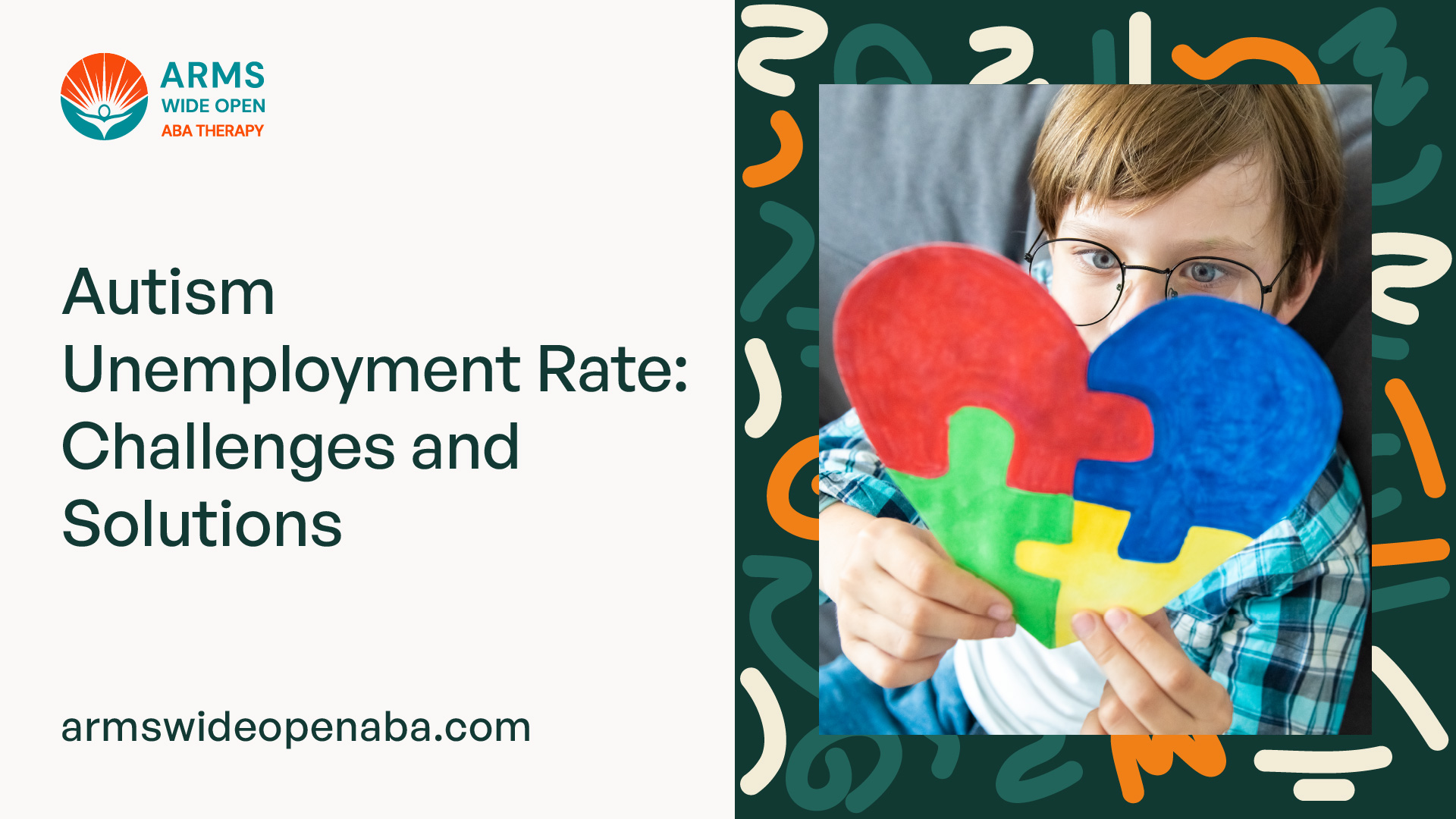
Overview of Autism Spectrum Disorder (ASD)
Autism Spectrum Disorder (ASD) is a neurodevelopmental condition characterized by difficulties in social interaction, communication, and repetitive behavior patterns. It is a spectrum disorder, meaning that it affects individuals to varying degrees, with symptoms ranging from mild to severe.
ASD can present challenges in various areas, including verbal and non-verbal communication, social interaction, sensory sensitivities, and executive functioning. These challenges can impact an individual's ability to navigate the workplace effectively.
Statistics on Autism Unemployment Rates
The unemployment rates among individuals with autism are significantly higher compared to the general population. Let's take a look at some statistics that shed light on the autism unemployment challenge:

It is important to note that the unemployment rates for individuals with autism may vary depending on factors such as age, education level, and support available. However, these statistics highlight the need for greater awareness, understanding, and support to address the employment barriers faced by individuals with autism.
Understanding the unique challenges and statistics surrounding the autism unemployment challenge is just the first step in creating a more inclusive and supportive work environment. In the following sections, we will explore the barriers to employment for individuals with autism and discuss the initiatives and strategies that can help overcome these challenges.
Barriers to Employment for Individuals with Autism
Individuals with autism face unique challenges when it comes to finding and maintaining employment. These challenges can be attributed to social and communication difficulties, sensory sensitivities, and a lack of understanding and support from employers and colleagues.
Social and Communication Challenges
One of the primary barriers individuals with autism face in the workplace is related to social and communication skills. Autism Spectrum Disorder (ASD) can affect a person's ability to understand social cues, engage in small talk, and interpret nonverbal communication. These challenges can make it difficult for individuals with autism to navigate social interactions and establish meaningful connections with their colleagues.
To address these challenges, employers can provide training programs that focus on social and communication skills development. This can help individuals with autism improve their ability to effectively communicate and collaborate with their coworkers. Additionally, fostering a supportive and inclusive work environment where coworkers are educated about autism can create a more understanding and accepting atmosphere.
Sensory Sensitivities in the Workplace
Sensory sensitivities are another significant barrier to employment for individuals with autism. Many individuals with autism experience hypersensitivity or hyposensitivity to sensory stimuli, such as noise, light, or touch. The workplace can be overwhelming for someone with sensory sensitivities, leading to difficulties in concentration, increased anxiety, and reduced productivity.
Employers can make accommodations to create a sensory-friendly work environment. This may include providing noise-canceling headphones, adjusting lighting levels, or creating designated quiet spaces where individuals can take short breaks. By considering and addressing sensory sensitivities, employers can help individuals with autism thrive in the workplace.
Lack of Understanding and Support
A lack of understanding and support from employers and colleagues can be a significant barrier to employment for individuals with autism. Many employers may not be familiar with the characteristics of autism or may hold misconceptions about the capabilities of individuals on the spectrum. This can result in a lack of accommodations and support necessary for individuals with autism to succeed in the workplace.
To overcome this barrier, it is crucial for employers to foster a culture of inclusivity and provide training to educate their staff about autism. This can help create a more supportive and accommodating environment where individuals with autism are valued for their unique strengths and contributions. Additionally, providing mentorship programs or assigning workplace buddies can offer guidance and support to individuals with autism as they navigate their job responsibilities.
By addressing these barriers, employers can create opportunities for individuals with autism to excel in the workplace. With the right support and accommodations, individuals with autism can contribute their skills and talents to the workforce, helping to break down barriers and promote inclusivity in the job market.
Addressing the Challenges
In order to tackle the autism unemployment challenge, it is crucial to address the specific barriers that individuals with autism face in the workplace. Several strategies and initiatives have been developed to provide support and create inclusive environments for individuals with autism to thrive professionally.
Tailored Job Training and Support Programs
Tailored job training and support programs play a significant role in preparing individuals with autism for employment. These programs are designed to provide specific skills and knowledge needed in the workplace while considering the unique strengths and challenges of individuals on the autism spectrum.

By tailoring job training and support programs to address the specific needs of individuals with autism, it becomes possible to enhance their employment prospects and help them overcome the challenges they may face.
Workplace Accommodations and Inclusive Practices
Creating an inclusive work environment involves implementing workplace accommodations and practices that support individuals with autism. These accommodations can help individuals with autism navigate the challenges they may encounter and maximize their potential in the workplace.
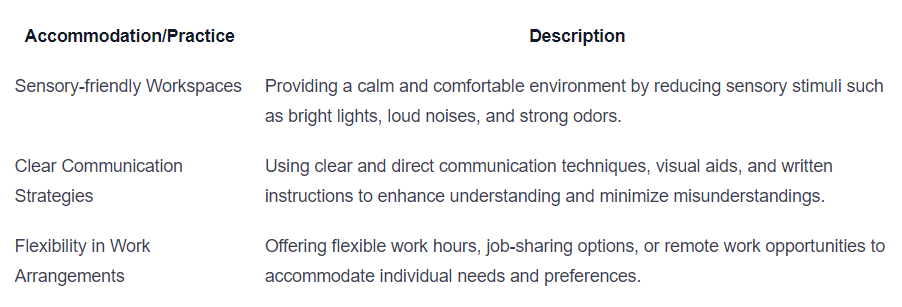
By implementing these accommodations and practices, employers can create an inclusive and supportive workplace where individuals with autism can thrive and contribute their unique skills and talents.
Advocacy and Awareness Initiatives
Advocacy and awareness initiatives play a crucial role in addressing the autism unemployment challenge. These efforts aim to increase understanding and acceptance of autism in society, promote inclusive hiring practices, and advocate for the rights and opportunities of individuals with autism in the workforce.
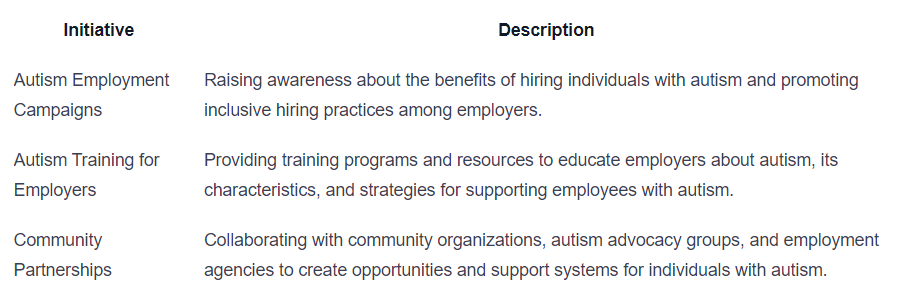
Through advocacy and awareness initiatives, a more inclusive and supportive society can be fostered, leading to increased employment opportunities and improved outcomes for individuals with autism.
By addressing the challenges through tailored job training and support programs, workplace accommodations and inclusive practices, as well as advocacy and awareness initiatives, we can pave the way for a more inclusive and diverse workforce that empowers individuals with autism to achieve their full potential.
Success Stories
While the challenges of autism unemployment are significant, there are numerous success stories that highlight the potential for individuals with autism to thrive in the workplace. These stories showcase the abilities, talents, and unique perspectives that individuals with autism bring to various industries. Additionally, there are companies that actively promote inclusivity and diversity, creating environments where individuals with autism can excel.
Individuals with Autism Thriving in the Workplace
Many individuals with autism have found fulfilling and successful careers across a wide range of industries. Their unique strengths and abilities often contribute to their accomplishments in the workplace. Here are some inspiring success stories:
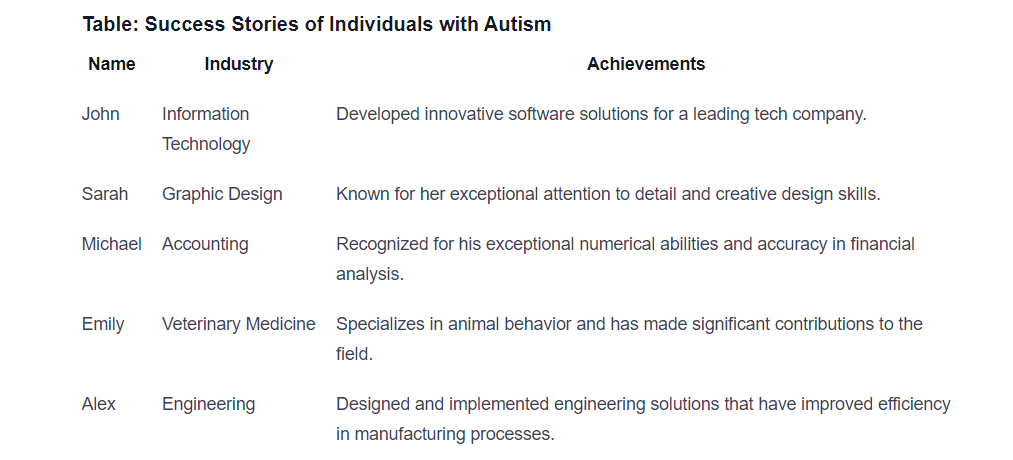
These success stories demonstrate that individuals with autism can make valuable contributions and excel in various professions. By recognizing and harnessing their unique strengths, companies can benefit from the diverse perspectives and skills that individuals with autism bring to the table.
Companies Promoting Inclusivity and Diversity
In recent years, there has been a growing recognition of the importance of inclusivity and diversity in the workplace. Many companies have taken proactive steps to create environments that are conducive to the success of individuals with autism. These companies prioritize providing support, accommodations, and opportunities for individuals with autism to thrive. Here are a few examples:
Table: Companies Promoting Inclusivity and Diversity
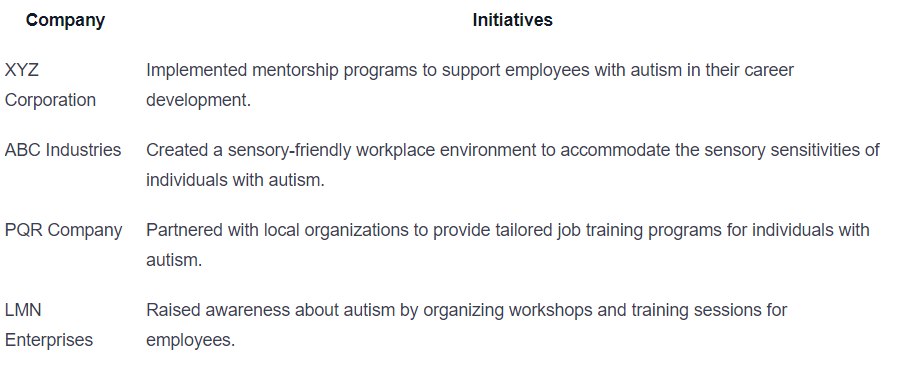
By actively promoting inclusivity and diversity, these companies are not only providing opportunities for individuals with autism but also fostering a more inclusive and supportive work culture overall.
The success stories of individuals with autism and the efforts of companies promoting inclusivity and diversity serve as inspiring examples that showcase the potential for change. By embracing the unique strengths and abilities of individuals with autism, and creating supportive environments, we can overcome the challenges of autism unemployment and create a more inclusive workforce.
Empowering Individuals with Autism
Empowering individuals with autism is essential to help them overcome the challenges they face in finding and maintaining employment. By focusing on building self-esteem and confidence, providing mentorship and guidance, and encouraging independence and self-advocacy, we can support their journey towards a successful and fulfilling career.
Building Self-Esteem and Confidence
Building self-esteem and confidence is crucial for individuals with autism as they navigate the job market. By nurturing a positive self-image, they can approach employment opportunities with a sense of self-assurance. Here are some strategies to promote self-esteem and confidence:
- Encouraging individuals with autism to recognize and celebrate their strengths and unique abilities.
- Providing opportunities for skill development and showcasing their talents.
- Creating a supportive and inclusive environment where they feel valued and appreciated.
Providing Mentorship and Guidance
Mentorship and guidance play a significant role in helping individuals with autism navigate their career paths. Having someone to provide support, guidance, and advice can make a tremendous difference in their professional development. Here are ways to provide mentorship and guidance:
- Pairing individuals with autism with mentors who have experience in their chosen field.
- Offering guidance on job search strategies, interview skills, and workplace etiquette.
- Providing ongoing support and feedback to help them overcome challenges and achieve their goals.
Encouraging Independence and Self-Advocacy
Encouraging individuals with autism to develop independence and self-advocacy skills empowers them to take control of their career journeys. Here are some ways to promote independence and self-advocacy:
- Teaching self-advocacy skills, such as effectively communicating their needs and accommodations in the workplace.
- Encouraging individuals to take initiative in their career development through networking, attending industry events, and seeking out new opportunities.
- Supporting individuals in setting and working towards their own career goals, fostering a sense of autonomy and ownership.
By focusing on building self-esteem and confidence, providing mentorship and guidance, and encouraging independence and self-advocacy, we can empower individuals with autism to thrive in the workplace. Through these efforts, we can create an inclusive society that values the unique talents and contributions of every individual, regardless of their neurodiversity.
Collaborating for Change
In order to address the autism unemployment challenge, collaboration between various stakeholders is essential. Government initiatives, community support, and available resources play a vital role in creating a more inclusive and supportive environment for individuals with autism. By working together, we can bring about positive change and increase employment opportunities for this talented and capable population.
Government Initiatives and Policies
Government initiatives and policies have a significant impact on the employment prospects of individuals with autism. By implementing supportive measures and regulations, governments can create an environment that encourages inclusive hiring practices and provides necessary accommodations. Some key government initiatives and policies include:
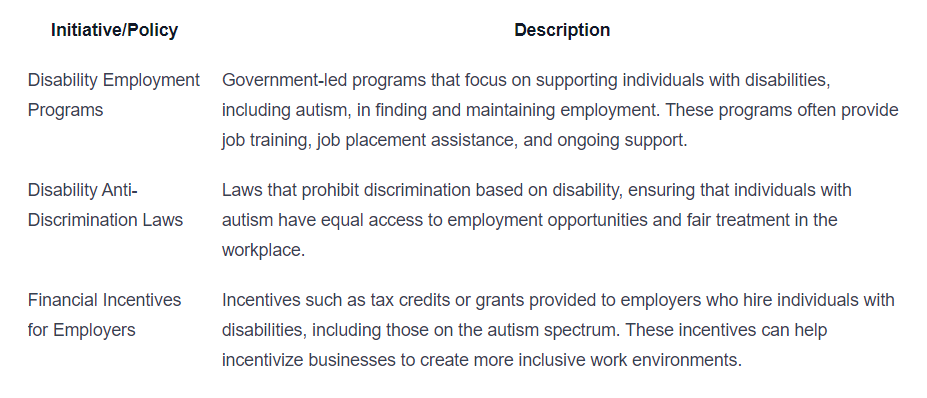
Community Support and Resources
Community support and available resources play a crucial role in assisting individuals with autism in their employment journey. Communities can come together to provide various forms of support, including:
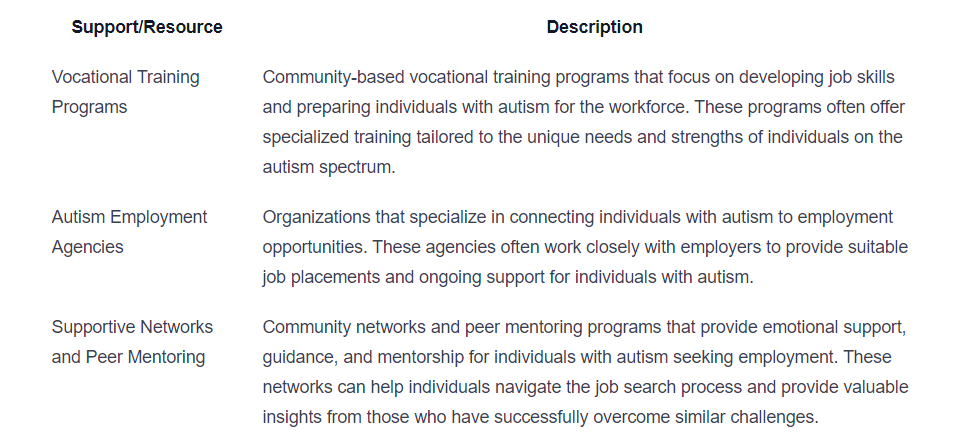
Future Outlook for Autism Employment Opportunities
The future outlook for autism employment opportunities is promising, thanks to the increasing awareness and efforts to promote inclusivity. As society becomes more educated about autism and the unique skills and perspectives individuals on the spectrum bring to the workplace, there is a growing recognition of the untapped potential within this population.
Employers are gradually recognizing the benefits of hiring individuals with autism, such as their attention to detail, strong focus, and unique problem-solving abilities. Additionally, advancements in technology and remote work options are creating new possibilities for individuals with autism to thrive in various industries.
While there is still progress to be made, the collective efforts of governments, communities, and employers are paving the way for a more inclusive future. By continuing to collaborate and advocate for change, we can create employment opportunities that empower individuals with autism and harness their full potential in the workforce.
Sources
https://www.abtaba.com/blog/autism-unemployment
https://www.crossrivertherapy.com/autism/autism-unemployment-rate
https://www.discoveryaba.com/aba-therapy/autism-unemployment-rate
Similar articles
We’re here to help you

Our team is here to assist you in this process. Contact us for any assistance.
it’s easy to apply
We Accept Most Insurances
Our in-network insurance partnerships make ABA therapy more accessible to families throughout our service areas.







Our Insurance Process
We'll request your insurance details to help us verify your plan's coverage for ABA therapy. Once we've received this information, we'll walk you through your benefits, including copayments, deductibles and out-of-pocket maximums, so you know what to expect in advance.
Our team will then handle the preauthorization and all the necessary paperwork.
.svg)





















.jpeg)


































.jpeg)




.jpeg)







.jpeg)











.jpeg)
















